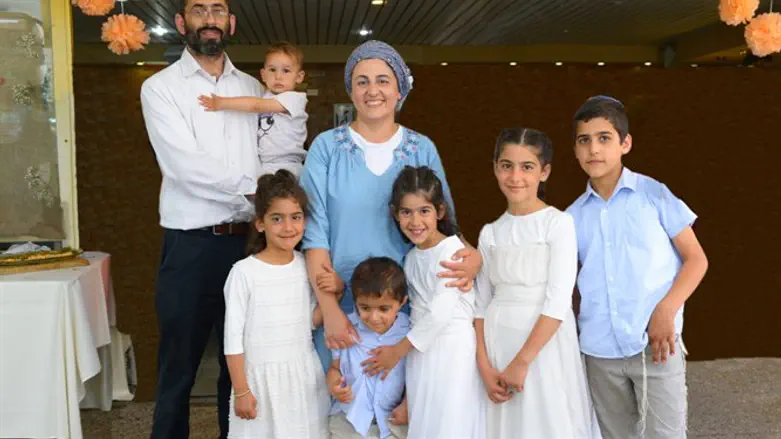
Ariel Gross, sister of Yariv Atar, who died together with his wife and six children in a catastrophic car accident eight months ago, is finding it difficult to move on since the fatal accident on Route 90 near the Dead Sea.
"At this point in time, I don't see myself moving on, but I believe that I will be forced to move on and deal with it in the best way possible," Gross says in an interview with Arutz Sheva.
Gross refers to that harrowing day when she lost her brother and his family. "It began as a regular day, even a very happy day. We were preparing to meet - my family and his family. In the morning, I got a message from [Yariv's wife] Shoshi that they were going to be late and I told her no problem and we would follow suit. When we left we let them know."
"We arrived at our meeting point and I start unpacking the car and getting organized," Gross continues. "While I'm getting organized, I see fire engines and I assumed there was a fire. A minivan like theirs arrives. We wave and then realize that it isn't their minivan. I approach the vehicle and ask the occupants: 'Why aren't cars coming from that direction for a long time?' They said there was an accident. I ask my daughter to phone Shoshi but she doesn't answer. I said to my husband, 'It's a kilometer and a half from here.' I run there. My husband said that meanwhile, he'll take the children to the stream."
In those moments, Gross already has a sub-conscious feeling but she tries to fight it. "I drive, stop at the side of the road, and see the back part of a minivan like my brother's. These are hallucinatory moments in which I'm trying to convince myself, although everything is perfectly clear to me. All the emotions mix together and I think about my mother."
"It was clear right away that it was them and that it was a horrible disaster. I tried to hold on to illogical sparks of hope. This is my brother and my nephews and nieces and they're part of me."
"I can't compare the emptiness inside me to that of my mother. Only two hours later, they told me I can tell her and I didn't tell her. What went through my head is how she'll respond. She's a very strong and realistic woman and I knew it was going to break her."
"I remember calling my older brother and telling him: 'They didn't tell me 100%, but a disaster happened. Yariv and the whole family is probably no longer with us. How do we tell Mom?"
The Atar family, Yariv, Shoshi and their six children - Yaakov Israel, 12, Ateret, 11, Ayala, 9, Moriah, 7, Yedid, 5, and Avigayil, 3, were residents of Psagot in Binyamin. They took advantage of the vacation day due to local elections and were on their way to a family outing. On Route 90, an SUV traveling towards them drifted into the opposite lane, crashed into them, and their car caught on fire. The entire family perished in the fire.
Last week, the Be'er Sheva District Court convicted truck driver Laurent Ankri of manslaughter as part of a plea bargain for the car accident which killed the Atar family. The prosecution will seek a sentence of up to 13 years in prison.
Police found cannabis in Ankri's car following the crash and performed a blood test on him. However multiple mistakes occurred during the investigation, including the fact that a police officer failed to take the blood test straight to the laboratory. As part of the plea bargain, the charge of driving under the influence of cannabis was removed although Ankri reportedly admitted to smoking medical marijuana before the crash.
Gross explains that the family has undergone a change regarding the driver. "At first we tried to understand what the driver was going through as well as the other people present at the accident. But for all sorts of reasons - the conduct of his family and his lawyers - we lost empathy. There is no place for revenge here. It's clear to us that he did not intend to kill Yariv and Shoshi and their six children."
"His confession disappointed me, I expected him to express remorse to us. At the same time he confessed to the judge, he could have turned around to us and said, 'I'm sorry' - to take responsibility for his actions."